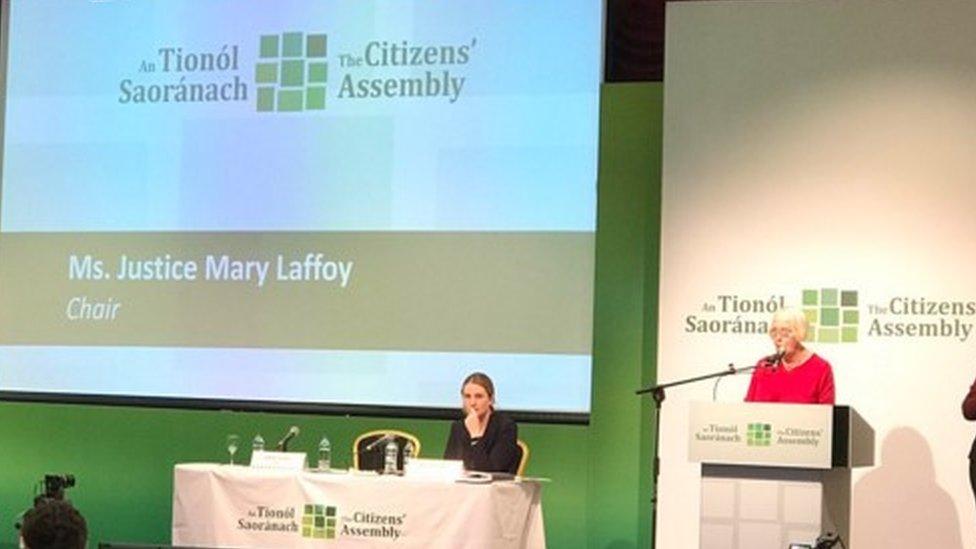Citizens' Assembly looks set for Northern Ireland
- Published
- comments
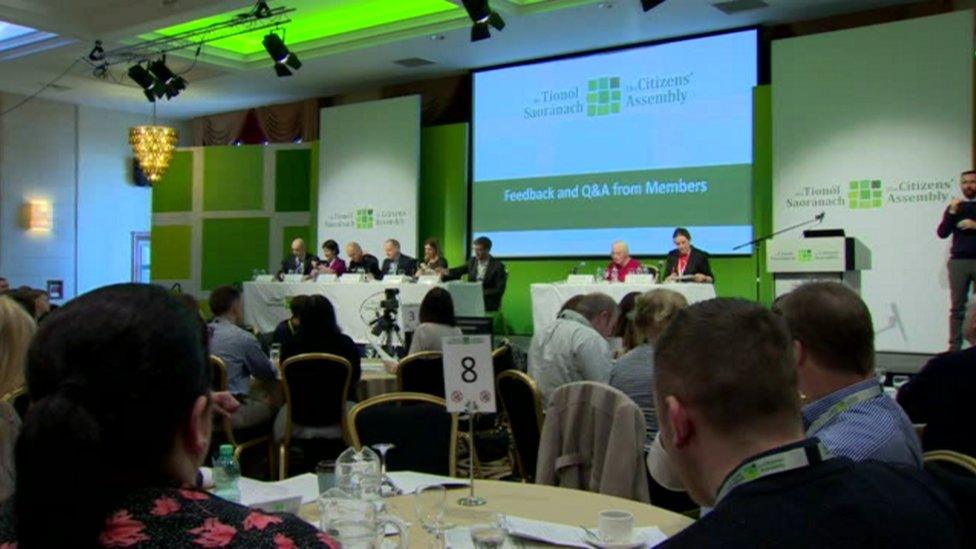
The proposed Northern Ireland Citizens' Assembly would be closely modelled on this example in the Republic of Ireland
Plans for a Citizens' Assembly for Northern Ireland are advanced and it is hoped the body will be up and running this year.
The group will be made up of people picked randomly from the electoral roll, reflecting the composition of Northern Ireland society.
They will be asked to debate subjects that politicians fail to agree on.
The body, made up of 99 citizens and a chairperson, will run like the assembly that currently operates in the Republic of Ireland.
That has been tasked by the Dáil (Irish parliament) to make recommendations on a number of issues including climate change, referendums, and fixed-term parliaments as well as abortion.
The job of assembly members is to debate and discuss political and constitutional issues and come up with conclusions.
People with different views
Funding for the Northern Ireland operation has been made available by Building Change Trust, external, which supports and invests in the voluntary and community sectors in Northern Ireland.
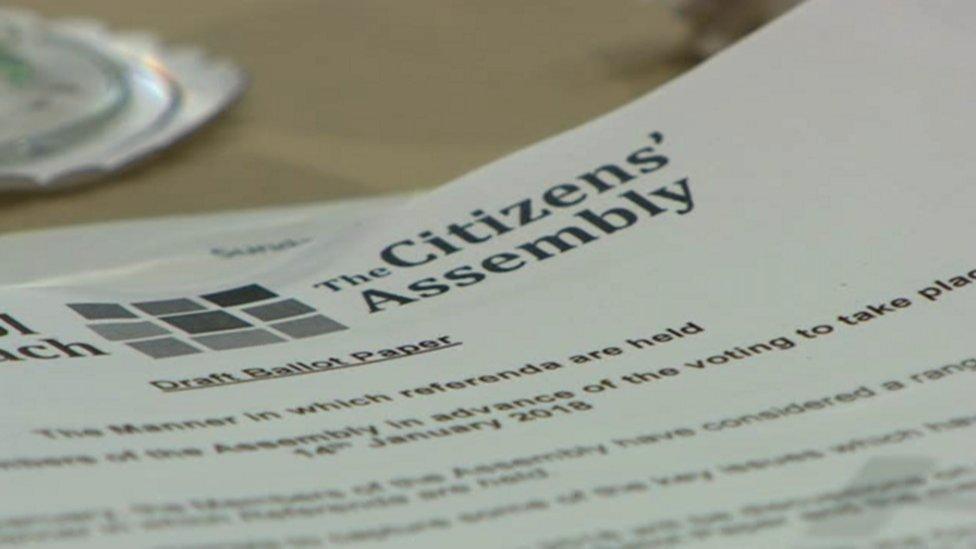
Members of the Irish assembly are balloted on controversial issues
"It would take one single topic and basically would function over two weekends," Paul Braithwaite from the trust told the BBC.
"So you would have two weekends where 100 members of the public would come together."
"They would be given a topic. They would hear from expert witnesses. They would ask them questions.
"They would deliberate with one another and the key thing here is talking to people who have different views from them."
Building Change Trust has offered £100,000 to Involve - a charitable think-tank - to conduct the Northern Ireland operation.
The donation is conditional on Involve raising additional funding to deliver the project, but this is expected to happen.
"We hope that the experience of this citizens' assembly will encourage the Northern Ireland Assembly to establish a citizens' assembly to support their decision making," said Involve director Tim Hughes.
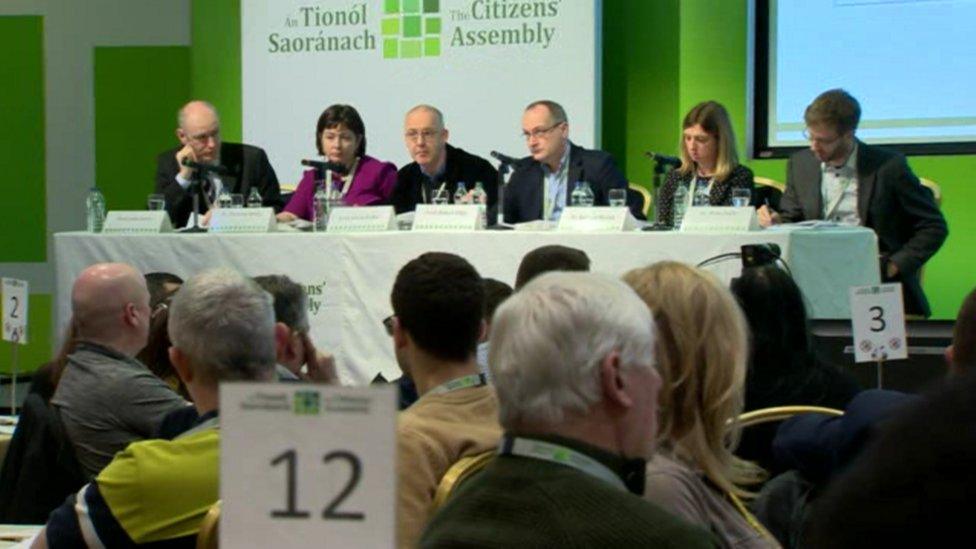
The Irish Citizens' Assembly hears from a panel of experts
Quintin Oliver from the Belfast-based public affairs consultancy, Stratagem, is helping to advise those behind the plan for a citizens' assembly.
"I think you would be surprised how 100 ordinary people could very quickly come to practical, pragmatic, achievable solutions and the politicians could be very grateful for that help," he said.
Politicians from all the main parties have been briefed about the idea of a citizens' assembly.
It is expected that the body, which will have no official status, could be up and running within months.
Political debate
Last weekend, Green Party MLA Steven Agnew joined Sinn Féin's Emma Rogan and the DUP'S Jim Wells and observed the Irish assembly which sits at Malahide, near Dublin.
Mr Agnew, who is an advocate of the idea, believes a citizens' body could assist with political debate in Northern Ireland.
"I hear politicians say all the time what most people believe," he said.
"We don't know what most people believe but actually a citizens' assembly is a good way of testing that."
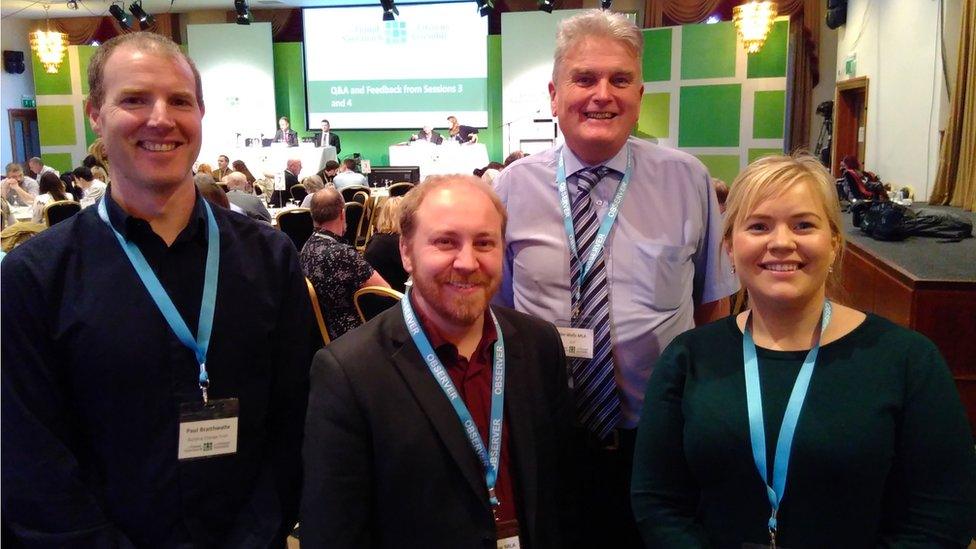
Northern observers: Paul Braithwaite, Steven Agnew, Jim Wells and Emma Rogan (L-R)
However, DUP MLA Jim Wells is concerned about what a Northern Ireland version might consider.
"In the Irish Republic the Citizens' Assembly has been used as a sounding board for controversial social issues such as a redefinition of marriage and change in the abortion legislation," he said.
"Those decisions should be made by elected representatives in the Northern Ireland Assembly. They are incredibly important and they are incredibly controversial.
"They should be best made by elected representatives, rather than a group that is not answerable to the electorate."
Sinn Féin MLA Emma Rogan said citizens' assemblies were no substitute for democratically elected bodies and legislatures.
"When a citizens' assembly makes recommendations it is important that there is a mechanism to ensure that these issues are considered by relevant legislatures. They should not be simply ignored as has happened in the past," she said.
Civic Forum II?
Creating a new assembly for debate has been tried before.
Back in 2000, a Civic Forum was set up under the auspices of the Good Friday Agreement, external, with people appointed from different sectors of society.
However, this new assembly would be different in that members would be selected at random, rather like selecting a jury, and the entire group would be representative of society.
The topics for debate for a Northern Ireland citizens' assembly have not been chosen, but could include issues like the transfer test, organ donation or political structures at Stormont.
Professor David Farrell from University College Dublin thinks the idea has much merit at the moment.
"I think something like this would be very timely in Northern Ireland. You have this vacuum right now why not use this opportunity that the vacuum has created to try something like this," he said.
"We are showing south of the border that something like this can work so why not try it north of the border as well."
You can see more about the proposed Northern Ireland citizens' assembly on The View on Thursday at 22:40 GMT on BBC One NI.
- Published23 April 2017
